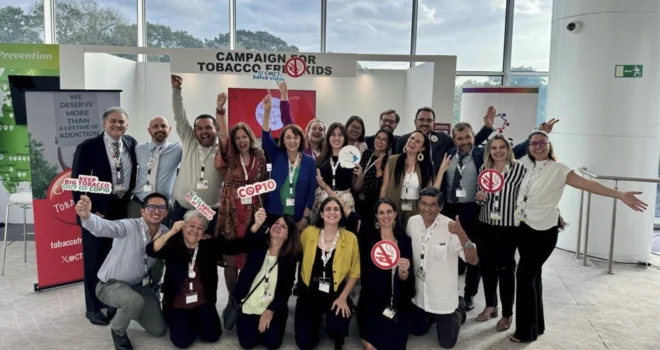Yesterday the world marked the 15th anniversary of the entry into force of the WHO Framework Convention on Tobacco Control (FCTC). The FCTC remains the first and only international treaty on public health negotiated under the auspices of World Health Organization. It was adopted by the World Health Assembly on 21 May 2003. It has since become one of the most rapidly and widely embraced treaties within the entire international political system.
Smoking is estimated to cause nearly 10% of all cardiovascular disease (CVD) and remains the second leading cause of CVD after high blood pressure. Additionally, nearly 6 million people die from tobacco use or exposure to secondhand smoke each year, accounting for 6% of female and 12% of male deaths worldwide. By 2030 tobacco-related deaths are projected to increase to more than 8 million deaths a year. But tobacco use is both avoidable and preventable, and there are many public health and policy tools, such as tobacco taxation, that can help us tackle the threat. Working towards a tobacco-free world is therefore a key strategic priority for the World Heart Federation.
A legal framework for saving lives from the harms of tobacco
The aim of the Convention is to protect current and future generations from the devastating health, social, environmental and economic consequences of tobacco consumption and exposure to tobacco smoke. For the past fifteen years, the FCTC has played a critically important role in curbing the global tobacco epidemic by providing both a roadmap for policy change and a catalyst for action. At present there are 181 Parties to the FCTC, which means over 90% of the world’s population is covered.
In addition to helping public health advocates in the promotion of tobacco control, the Convention was a touchstone for creating a strong legal framework for international cooperation on health topics. It has proven instrumental in legal defenses against the tobacco industry, while simultaneously helping to increase awareness of tobacco industry interference. Strengthening implementation of the FCTC is also fully embedded in the Sustainable Development Goals as target 3.A.
15 of FCTC implementation – keeping up the fight on tobacco!
Among the many achievements of the FCTC, the gains of low-income and middle-income countries in introducing effective tobacco control have been a major victory. “The case is clear: implementing the FCTC is a powerful means for Parties [to the Convention] to improve the lives of their citizens and ensure a better future of their countries,” shared Dr Adriana Blanco Marquizo, Head of the Secretariat of the WHO FCTC and the Protocol.
After 15 years of existence, the FCTC has succeeded in keeping tobacco control high on the global political agenda, while saving lives and improving global health. It remains a vital tool for our work at the World Heart Federation, and we look forward to celebrating its many future successes in years to come!


